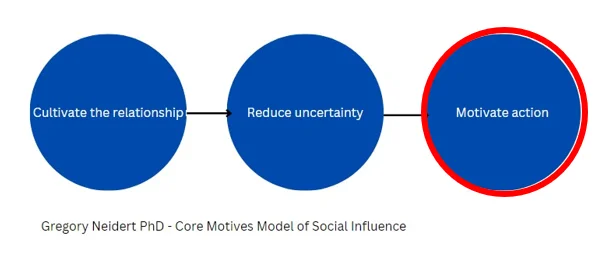Here’s the final blog on Dr Gregory Neidert’s “Core Motives Model of Social Influence” – stage 3.

By this stage, you’ve cultivated the relationship with the person you’d like to influence and reduced any uncertainty about the validity and appropriateness of your proposal through the use of the principles of authority and social proof.
The final stage of the influence process is to motivate them to take action – to buy the idea, good or service that you’re selling.
In practice, this means that they’ll agree to your suggestion, buy your product, or whatever it is you’re trying to get them to do. This is applicable to Sales, Procurement, Marketing, HR or anywhere else.
One option to flush-out any objections at this stage is to use the “peel the onion” technique.
The two remaining principles of influence you can use at this stage are: commitment and consistency and scarcity.
Let’s take a look at each of these.
1. Commitment and consistency – we tend to act in accordance with previous commitments we’ve made. Further, if we’ve previously made commitments to someone else, we’re more likely to behave consistently in the future when asked for a commitment from that person, in some cases, even if that new commitment is much bigger.
This effect is much stronger if the commitment has been made publicly, such as a commitment to achieving a deadline that was voiced during a meeting.
2. Scarcity – as human beings we are programmed to avoid loss, or so-called “FOMO” – fear of missing out. Studies have shown that we’re twice as likely to avoid a loss as we are to secure a gain! That explains the approach of some sports teams I follow…
Opportunities appear more valuable when they’re rare.
One of the most powerful practical applications of this principle is in a negotiation. If you’re moving towards closing a deal and there are just one or two final sticking points that you need to overcome, point to loss aversion.
Instead of saying, “If you agree to this, we’ve got a deal”, it’s psychologically much more powerful if you re-phrase the statement to “We’ve got a deal. You just need to agree this last point”.
We’re so motivated to avoid loss that with an agreement within our grasp, people are more likely to accepting your proposal.